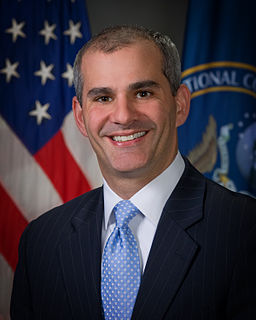A Quote by Michael Leiter
I don't think bulk data collection was an enormous factor here, because generally, that deals with overseas calls to the United States. But what bulk data collection did was make the process more efficient. So there were no silver bullets there.
Related Quotes
If Senator Rubio were doing his job and in Congress more, he might know that the program 'phone records of a potential terrorist cause' continues. It's been ongoing for the last six months. So the Paris tragedy, this tragedy happened while we were still doing bulk collection, all bulk collection. Also in France, they have a program a thousand-fold more invasive, collecting all of the data of all of the French.
Let's say tomorrow that there was a president, that we elected a president that eliminated the bulk collection of data. Let's just say it happened. What do you think would happen? People are like 'the sky would fall. We would be overrun with jihadists.' Maybe we could rely on the Constitution. Maybe we could get warrants. ... If you make the warrant specific, there's no limit to what you can get through a warrant.
Scientific data are not taken for museum purposes; they are taken as a basis for doing something. If nothing is to be done with the data, then there is no use in collecting any. The ultimate purpose of taking data is to provide a basis for action or a recommendation for action. The step intermediate between the collection of data and the action is prediction.
The USA Freedom Act does not propose that we abandon any and all efforts to analyze telephone data, what we're talking about here is a program that currently contemplates the collection of all data just as a routine matter and the aggregation of all that data in one database. That causes concerns for a lot of people... There's a lot of potential for abuse.
Every day, I absorb countless data bits through emails, phone calls, and articles; process the data; and transmit back new bits through more emails, phone calls, and articles. I don't really know where I fit into the great scheme of things and how my bits of data connect with the bits produced by billions of other humans and computers.
Men and machines are good at different things. People form plans and make decisions in complicated situations. We are less good at making sense of enormous amounts of data. Computers are exactly the opposite: they excel at efficient data processing but struggle to make basic judgments that would be simple for any human.






























